

Susan E. Jackson
- Distinguished Professor Emerita, Human Resource Management (HRM)
Education
B.A., University of Minnesota
Ph.D., University of California at Berkeley
Expertise
- Managing for environmental sustainability
- Strategic human resource
- Employee burnout
- Work team diversity
Please see Research Publications tab for related articles on each topic.
Susan E. Jackson, Ph.D., is Distinguished Professor of Human Resource Management in the School of Management and Labor Relations at Rutgers, The State University of New Jersey. She received her B.A. in psychology and sociology from the University of Minnesota, master's and doctoral degrees in organizational and social psychology from the University of California at Berkeley, as well as an honorary doctorate (Dr. h.c.) from the University of Zürich. Prior to joining Rutgers, she was a member of the faculties at New York University, University of Michigan, and University of Maryland.
Her primary areas of expertise include managing for environmental sustainability, strategic human resource management, employee burnout, and work team diversity. She has published more than 150 scholarly articles and chapters on these and related topics, and authored or edited several books, including, Managing Human Resources, 12th edition (with R. Schuler and S. Werner), Managing Human Resources in Environmentally Sustainable Organizations (with D. Ones and S. Dilchert), The Oxford Handbook of Strategy Implementation: Managing Strategic Resources (with M. Hitt and others), Managing Knowledge for Sustainable Competitive Advantage (with M. Hitt and A. DeNisi), among others.
A Fellow of several professional organizations, her professional service activities have included serving as editor of the Academy of Management Review, past president of the Academy of Management, Chair of the Organizational Behavior Division of the Academy of Management, and conference chair for the Society of Industrial and Organizational Psychology and Division 14 of the American Psychological Association.
Research and Publications
- What's Next for Green HRM?
- Culture as Context: A Five-Country Study of Discretionary Green Workplace Behavior
- HRM Institutional Entrepreneurship for Sustainable Business Organizations (available online here)
- Green HRM in Emergence: Review and Future Directions
- Building Sustainable Organizations in China
- Multilevel Influences on Voluntary Workplace Green Behavior: Individual Differences, Leader Behavior, and Coworker Advocacy
- Greening Organizational Behavior: An Introduction to the Special Issue
- Managing Human Resources For Environmental Sustainability
- Portrait of A Slow Revolution Toward Environmental Sustainability
- Building Empirical Foundations To Inform Future Practice of Environmental Sustainability
- State-of-The-Art And Future Directions For Green Human Resource Management: Introduction To The Special Issue
- The Greening Of Strategic HRM Scholarship
- State of the Field of Strategic Human Resource Management
- The Imperative for Strategy Implementation
- An Aspirational Framework for Strategic Human Resource Management
- Human Resource Management and Organizational Effectiveness: Yesterday and Today
- Behavioral Perspective of Strategic HRM
- HRM Practice and Scholarship: A North American Perspective
- Framework For Global Talent Management
- Human Resource Management in Context
- A Multiple Stakeholder Perspective:Implications for Measuring work-Family Outcomes
- Toward Developing Human Resource Management Systems for Knowledge-Intensive Teamwork
- A Quarter-Century Review of Human Resource Management In The U.S.: The Growth In Importance of the International Perspective
- Determinants of Human Resource Management Priorities and Implications for Industrial Relations
- HRM Practices In Service-Based Organizations:A Role Theory Perspective
- Human Resource Planning
- Managing Human Resources In Cross-Border Alliances
- Managing Individual Performance: A Strategic Perspective
- Understanding Human Resource Management In the Context of Organizations
- Making a Significant Difference with Burnout Interventions: Researcher and Practitioner Collaboration
- A Meta-analysis And Conceptual Critique of Research On Role Ambiguity And Role Conflict In Work Settings
- Burnout In Organizational Settings
- Does Job Control Control Job Stress?
- Educator Burnout:Sources and Consequences
- Managing Stress Through PHRM Practices: An Uncertainty Interpretation
- Maslach Burnout Inventory
- Preventing Employee Burnout
- Joint Effects of Faultline Strength and Diversity Climate on Loyal Behavior
- The Consequences of Educational Specialty and Nationality Faultlines For Project Teams
- Faultline Index for Groups (FIG) Instruction Manual
- SAS Program for Faultline Calculations
- Work Team Diversity
- The People Make The Place Complicated
- Cross-Level Effects of Workplace Diversity On Sales Performance And Pay
- Recent Research On Team and Organizational Diversity:SWOT Analysis and Implications
- The Consequences of Diversity in Multidisciplinary Work Teams
- Consequences of Group Composition for the Interpersonal Dynamics of Strategic Issue Processing
- Cultural Diversity In Cross-border Alliances
- Diversity In Social Context: A Multi-attribute, Multi-level Analysis of Team Diversity and Sales Performance
- The Effects of Diversity on Business Performance:Report of a Feasibility Study Of The Diversity Research Network
- Managing Workforce Diversity To Enhance Cooperation In Organizations
- Research On Domestic and International Diversity In Organizations: A Merger that Works?
- Socialization Amidst Diversity: The Impact of Demographics On Work Team Oldtimers And Newcomers
- Some Differences Make a Difference:Individual Dissimilarity and Group Heterogeneity As Correlates of Recruitment, Promotions, And Turnover
- Understanding The Dynamics Of Diversity In Decision Making Teams
- Using organizational science research to address U.S. federal agencies’ management and labor needs
- The Internal and External Networks of Knowledge-Intensive Teams
- Coworker Trust And Knowledge Creation: A Multi-level Analysis
- Knowledge Work
- Toward Developing Human Resource Management Systems For Knowledge-Intensive Teamwork
- Managing Human Resources For Knowledge-Based Competition: New Research Directions
- Can Knowledge-Intensive Teamwork Be Managed? Examining the Roles of HRM Systems and Leadership
- Building Theoretical and Empirical Bridges Across Levels: Multilevel Research in Management
- Commitment to Self-Identification: A Sociopsychological Approach to Personality
- Explaining Performance Variability: Contributions of Goal Setting, Task Characteristics, and Evaluative Contexts
- Identity Implications of Conformity:Sex Differences in Normative and Attributional Judgments
- Measurement of Commitment to Role Identities
- Meta-Analysis Analysis
- Similarity and Positivity of Self-Description as Determinants of Estimated Appraisal and Attraction
Books
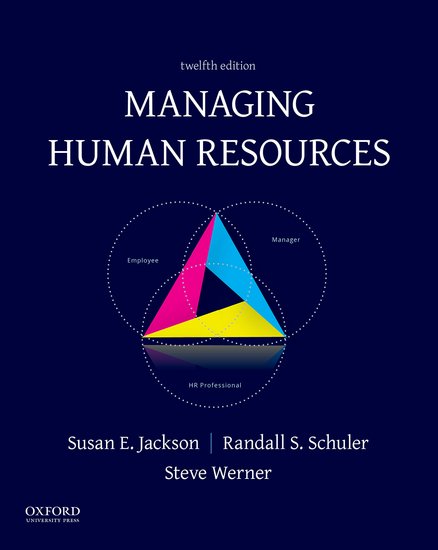
Managing Human Resources uses the authors' well-established Integrative Framework for Managing Human Resources to describe specific human resource (HR) activities including recruitment, training, performance management, and compensation. An important learning objective for students using Managing Human Resources is to develop an understanding of how the many specific HR activities can work together as a system that improves organizational effectiveness. This edition is a significantly revised and improved version of a title previously published by Cengage Learning.
Each chapter includes feature boxes highlighting five current themes in managing human resources:
- new technologies
- metrics and analytics
- ethics and corporate social responsibility
- diversity and inclusion
- teams
Click on the links below to view the:
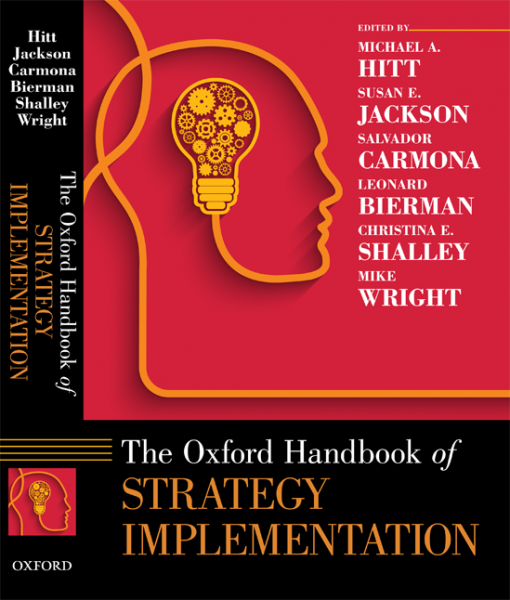
The Oxford Handbook of Strategy Implementation
Many strategies fail not because they are improperly formulated but because they are poorly implemented. The Oxford Handbook of Strategy Implementation examines the crucial role of implementation in how business and managerial strategies produce returns. In this wide-ranging collection of essays, leading scholars address governance, resources, human capital, and accounting-based control systems, advancing our understanding of strategy implementation and identifying opportunities for future research on this important process. Of particular interest to HRM scholars are chapters on the topics of The Aging Workforce; Women at the Topic; a Meta-analysis of Links Among HR Practices and Systems, Human Capital and Performance; HRM in the Healthcare Sector; Evidence-based Management at the Bottom of the Pyramid; and Goal-Setting Theory.
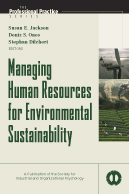
Managing Human Resources for Environmental Sustainability examines how businesses are responding to pressure from governments, customers, and employees alike to adopt environmentally friendly policies and practices, highlighting the central roles played by HRM and HRD professionals. Written by a diverse range of contributors, the book offers perspectives from authors who represent developed and emerging economies, span a variety of industries, and embody a mix of applied and academic backgrounds. This diversity is evident in the book’s case studies that show how environmentally sustainable practices are being implemented in organizations around the world. Chapters span the full range of macro and micro perspectives–including bottom-line impact, a review of legal requirements and political currents, and practical and professional implications of sustainability as a branding element. The environmental sustainability actions of many organizations may have once seemed merely public relations gestures. Now such actions seem more likely to become an organizational way of life, based on profit as well as principles of good governance, undergirded by law.
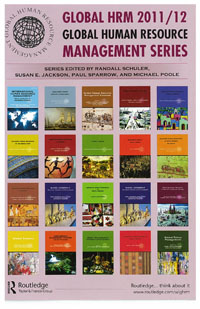
Global HRM Book Series
Edited and authored by the best and most well known researchers in the field of human resource management (HRM), this series of books offers students accessible coordinated and comprehensive textbooks on global HRM. To be used individually or together these books cover the main bases of the areas, including titles on global alliances, corporations, leadership, legal systems, staffing and compensation systems.
For more details on the full series visit: http://www.routledge.com/books/series/global_hrm_SE0692/
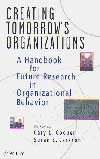
Creating Tomorrow's Organizations
If the present is almost too complex to understand, how does one think about the future? In reality, our understanding and conceptions of organizations are created by the vision and description of those who lead and study them. This book brings together an inter-disciplinary group of organization scholars who were invited to share their visions and accounts of leading-edge research, concepts and methods.
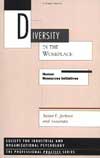
Diversity In the Workplace: Human Resource Initiatives
The importance of addressing diversity in the workplace has gained widespread recognition in recent years. Among the forces calling attention to diversity in the workplace are the changing nature of the workforce, globalization of labor and customer markets, and organizational restructuring, such as mergers and joint ventures which bring diverse corporate cultures together. Most firms, however, are only beginning to evaluate and adjust policies that were originally designed for yesterday's more homogeneous workforce. The large-scale organizational changes attracting attention are, for now, the exception to the rule, but they do present examples of what can be accomplished. Toward that end, this volume describes how nine prominent organizations have responded to the challenge. Featuring descriptive case studies from such firms as Xerox, Digital Equipment, Pacific Bell, American Express, Coopers & Lybrand, and Pepsi-Cola International, it covers international diversity and merging corporate cultures, as well as ethnic, gender, and lifestyle differences.
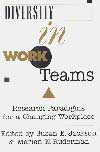
Diversity in Work Teams: Research Paradigms For A Changing Workplace explores how diversity affects one of the most popular management strategies used in business today: the formation of employee work teams. Work teams ideally operate to maximize flexibility, creativity, and productivity in a business environment. Frustrating this effort, however, is the increasing level of diversity found in the American workplace, which often heightens the difficulty of getting people to work together effectively. The authors of this volume argue that organizations must learn to understand and adjust to workplace diversity, because many of the specific assets and liabilities of work teams arise directly out of the diverse talents and perspectives of teams' individual members.
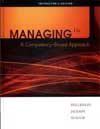
Managing: A Competency Based Approach and its support package are tailored for use in introductory management classes taught at any level in the university, as well as in junior colleges. Our vision for the tenth edition of Managing: A Competency Based Approach may be conveyed in one word-competencies. Through competencies, students develop understanding, skills, insights, knowledge, judgment, and intuition that enable them to become effective managers. The text is packed with updated and new competency-building features, interesting cases, and intriguing insights. They enable students to experience the excitement of contemporary organizational and managerial concepts, methods, and practices. Real-world examples are brought into the classroom throughout the text. We include fresh, relevant coverage of managers and organizations that will be relevant to students. In keeping with this reality-based perspective, we focus on telling it like it is as well as telling it like it should be. Students will learn from both good and bad applications of methods, practices, and concepts. In addition, we go beyond text presentations by challenging students to develop deeper insights and a portfolio of competencies. That way, students who study this text should come away equipped with enriched competencies, insights that they can use to develop their own competencies, and the confidence they need to develop their own professional potential.
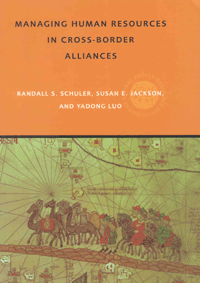
Managing Human Resources in Cross-Border Alliances
Table of Contents
- Managing human resources in cross-border alliances
- International joint ventures
- Managing human resources in international joint ventures
- International mergers and acquisitions
- Managing human resources in international mergers and acquisitions
- Managing cultural diversity in cross-border alliances
- Managing cooperation, control, structure, and exit in cross-border alliances
- Cross-border alliances and the HRM profession
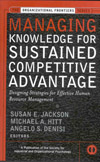
Managing Knowledge for Sustained Competitive Advantage
Focusing on the role of knowledge in human capital and human resource management, Managing Knowledge for Sustained Competitive Advantage explains why many scholars believe it is the direction for competition in the future and shows how industrial/organizational psychologists can not only contribute to our understanding of knowledge-based competition but also to the ability of companies to succeed within.
Table of Contents
- Introduction: The knowledge-based approach to sustainable competitive advantage
- Part Two: Work and organizational designs for knowledge-based competition
- Part Three: Staffing organizations for knowledge-based competition
- Part Four: Developing and motivating employees for knowledge-based competition
- Part Five: Measuring knowledge-based resources
- Part Six: Conclusion
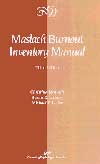
Maslach Burnout Inventory Manual
Burnout is a syndrome of emotional exhaustion, depersonalization, and reduced personal accomplishment that can occur among individuals who work with people in some capacity. A key aspect of the burnout syndrome is increased feelings of emotional exhaustion--as emotional resources are depleted, workers feel they are no longer able to give of themselves at a psychological level. Another aspect of the burnout syndrome is the development of depersonalization, that is, negative, cynical attitudes and feelings about one's clients. A third aspect of the burnout syndrome, reduced personal accomplishment, refers to the tendency to evaluate oneself negatively, particularly with regard to one's work with clients. Workers may feel unhappy about themselves and dissatisfied with their accomplishments on the job. Now recognized as the leading measure of burnout, the MBI assesses these three aspects of burnout using a short questionnaire. The initial research on the MBI was based on data from the United States and Canada. Subsequent studies have been done in many countries around the work, and the MBI has been translated into various languages. Psychometric studies of the MBI in these different settings have continued to validate the three-dimensional structure of the measure. To learn more about the MBI, contact Mindgarden, Inc.
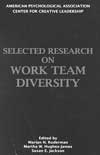
Selected Research on Work Team Diversity
Although much research has focused on the implications of changing workforce demographics for organizations and on characteristics of organizational settings, relatively few studies have been conducted on diversity within work teams. The seven research papers in this book, selected from a conference sponsored by the American Psychological Association, the Center for Creative Leadership, and New York University, expand the current state of knowledge on diverse teams and provide implications for further research and practice.
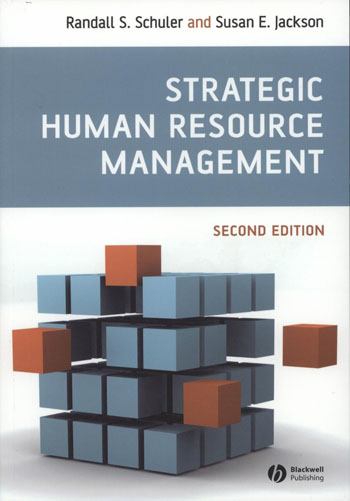
Strategic Human Resource Management, 2nd Edition
The second edition of this popular volume, edited by Randall S. Schuler and Susan E. Jackson, provides management student and senior practitioners with a completely new and updated guide to the latest work in the field. This selection of important and highly readable articles from authors around the world charts key developments that have changed the theory and practice of SHRM over the last six years.
Since the first edition in 1999, there have been two major forces at work in the field of HRM and SHRM:
- Globalization - Globalization has brought an increase in competition worldwide and has made the effective management of people even more important. Newer organizational forms like international joint ventures and international mergers and acquisitions have resulted. Together these have a huge impact on the fields of HRM and SHRM.
- Knowledge Management - Associated with globalization and increased competition, is the need for companies to be more knowledgeable in the dynamics of worldwide competition and labor markets, and to manage knowledge more systematically than ever before.


After more than twenty-two years in the School of Management and Labor Relations, Distinguished Professor Susan Jackson retired at the end of the Spring 2021 semester.


